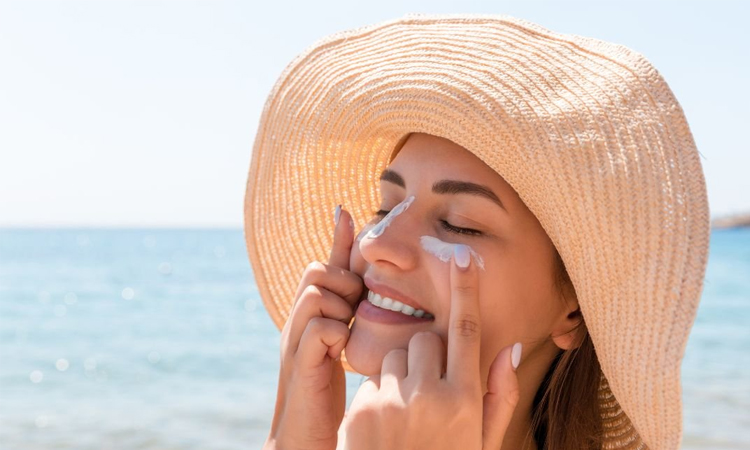
Why You Should Never Skip Sunscreen
Sunscreen isn’t just for beach days or summer vacations—it’s a daily essential for healthy, glowing skin. Whether it’s sunny or cloudy, UV rays are always present, and they can wreak havoc on your skin. From preventing premature aging to reducing the risk of skin cancer, sunscreen is your skin’s best defense. In this guide, we’ll dive into why sunscreen is essential every day and how to choose the right one for your skin type.
Why Sunscreen is Essential Every Day :
1. Protects Against Harmful UV Rays :
The sun emits two types of ultraviolet (UV) rays that damage your skin:
• UVA Rays: These penetrate deep into the skin, causing premature aging, wrinkles, and dark spots.
• UVB Rays: These affect the outer layer of the skin, leading to sunburns and direct DNA damage.
Sunscreen acts as a shield, blocking these harmful rays and preventing long-term damage.
2. Prevents Premature Aging :
Did you know that up to 90% of visible aging is caused by sun exposure? Regular use of sunscreen helps prevent:
• Fine lines and wrinkles
• Sagging skin
• Hyperpigmentation and dark spots
By incorporating sunscreen into your daily routine, you’re investing in youthful, radiant skin for years to come.
3. Reduces the Risk of Skin Cancer :
Skin cancer is one of the most common types of cancer worldwide, and UV exposure is a leading cause. Daily sunscreen use significantly lowers your risk of developing:
• Melanoma
• Basal cell carcinoma
• Squamous cell carcinoma
Think of sunscreen as your first line of defense against this life-threatening disease.
4. Maintains an Even Skin Tone :
Sun exposure can lead to uneven skin tone, dark spots, and melasma. Sunscreen helps:
• Prevent the overproduction of melanin
• Keep your complexion even and bright
• Reduce the appearance of existing discoloration
How to Choose the Right Sunscreen :
Not all sunscreens are created equal. Here’s what to look for when selecting the perfect one for your skin:
1. Broad-Spectrum Protection :
Always choose a sunscreen labeled “broad-spectrum,” which means it protects against both UVA and UVB rays.
2. SPF Matters :
• SPF 30: Blocks 97% of UVB rays (ideal for daily use).
• SPF 50: Blocks 98% of UVB rays (great for extended outdoor activities).
Higher SPF doesn’t mean double the protection, so SPF 30-50 is usually sufficient for most people.
3. Water-Resistant Formulas :
If you’re swimming or sweating, opt for a water-resistant sunscreen to ensure long-lasting protection.
4. Skin Type Considerations :
• Oily Skin: Look for oil-free, non-comedogenic formulas.
• Dry Skin: Choose sunscreens with added moisturizers or hyaluronic acid.
• Sensitive Skin: Opt for mineral-based sunscreens with zinc oxide or titanium dioxide.
Common Myths About Sunscreen :
Let’s debunk some common misconceptions about sunscreen:
1. “I Don’t Need Sunscreen on Cloudy Days.” :
Up to 80% of UV rays can penetrate clouds, so sunscreen is a must, rain or shine.
2. “Darker Skin Tones Don’t Need Sunscreen.” :
While melanin offers some natural protection, it’s not enough to prevent sun damage or skin cancer. Everyone, regardless of skin tone, needs sunscreen.
3. “Makeup with SPF is Enough.” :
Most makeup doesn’t provide adequate SPF coverage. Always apply a dedicated sunscreen underneath your makeup.
How to Apply Sunscreen Correctly :
Applying sunscreen the right way ensures maximum protection:
1. Use the Right Amount :
A nickel-sized amount (about 1/2 teaspoon) is needed for your face and neck. For your body, use about a shot glass full.
2. Reapply Regularly :
Reapply every 2 hours, especially after swimming, sweating, or towel drying.
3. Don’t Forget These Spots :
• Ears
• Back of the neck
• Tops of feet
• Hands
The Environmental Impact of Sunscreen :
While sunscreen is essential for skin protection, some formulas can harm marine life. Here’s how to choose eco-friendly options:
1. Avoid Oxybenzone and Octinoxate :
These chemicals are harmful to coral reefs. Opt for reef-safe sunscreens instead.
2. Choose Mineral-Based Sunscreens :
Zinc oxide and titanium dioxide are safer for the environment and effective for your skin.
Conclusion :
Make Sunscreen a Daily Habit
Sunscreen is more than just a skincare product—it’s a vital tool for protecting your health and maintaining your skin’s beauty. By understanding its importance and using it correctly, you can enjoy the sun safely while keeping your skin healthy and radiant. So, don’t wait—make sunscreen a non-negotiable part of your daily routine today!